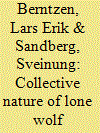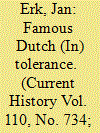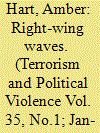| Srl | Item |
| 1 |
ID:
134985


|
|
|
|
|
| Summary/Abstract |
Anders Behring Breivik, a lone wolf terrorist, killed 77 people in two terrorist attacks in Norway in 2011. This study uses framing theory from social movement studies to compare his Manifesto with the rhetoric of the anti-Islamic movement that inspired him. The anti-Islamic movement has a dual, and sometimes inconsistent, collective action framing. On the one hand, they portray Islam as an existential threat to the West and a warlike enemy; on the other, they promote peaceful and democratic opposition. The potential for radicalization is thus immanent. This case study reveals the importance of seeing lone wolf terrorists as acting from rhetoric embedded in larger social movements. It further demonstrates, in detail, the subtle and complex ways in which political narratives rejecting terrorism and political violence still end up inspiring such acts.
|
|
|
|
|
|
|
|
|
|
|
|
|
|
|
|
| 2 |
ID:
102793


|
|
|
|
|
| Publication |
2011.
|
| Summary/Abstract |
Variations of Geert Wilders's xenophobic message are shared by the majority of the political parties represented in the
|
|
|
|
|
|
|
|
|
|
|
|
|
|
|
|
| 3 |
ID:
190862


|
|
|
|
|
| Summary/Abstract |
The increasing global prominence of right-wing extremism and terrorism has been noted by scholars and government agencies alike. While right-wing terrorism has been documented throughout postwar history, groups have evolved, resulting in diverse materializations of violence perpetrated on behalf of varying ideologies and perceived threats. This paper draws upon Campion’s research into Australian right-wing extremism and terrorism, where three ideological threat narratives were identified. The aim of this research was to determine the applicability of Rapoport’s “wave” theory to the international evolution of extreme right-wing activity. In doing so, Campion’s framework is utilized and a case study analysis undertaken, investigating anti-communist, anti-immigration and anti-Islamic rhetoric on a transnational and transhisto-rical basis. It is argued that waves are found internationally, and that Rapoport’s model is therefore applicable to the right-wing milieu. The paper concludes that the extreme right is on the cusp of the next wave and discusses trends that may inform those in a position to counteract the forthcoming wave of activity. There remains a need for law enforcement and security agencies to monitor right-wing extremism and terrorism activity to remain attuned to the ever-evolving threat as the next wave manifests.
|
|
|
|
|
|
|
|
|
|
|
|
|
|
|
|